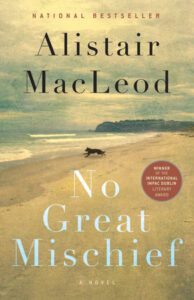Each month, we ask a member of faculty to tell us about one book that played an outsized role in making them who they are today. This month, we invite Kim Pittaway, Cohort Director of the MFA in Creative Nonfiction Program, to share her Words to Live By.
 What book have you chosen?
What book have you chosen?
Alistair MacLeod’s No Great Mischief.
When did you first read this book?
I read it not long after it was published—probably in 2000 or 2001.
Was it a book that you read quickly or did you take your time reading it?
I took it with me on a beach holiday, and had this strange experience of reading about places I’d lived in Toronto, places I’d visited in Cape Breton and about scenes set in winter, while sheltering from the sun under a beach umbrella. It was one of those books that you want to race to the end of, but also don’t want to finish—the perfect reader’s dilemma.
What was it about the book that first stood out to you?

It might seem odd for someone who is primarily a nonfiction writer to choose a work of fiction. But given its first-person voice, the book is, in a way, a fictional memoir: a family story told through the eyes of one member of the family. MacLeod’s characters were deeply familiar to me: in many ways, it seemed as if I were reading a story about the people on my mother’s side of the family. She was born in Cape Breton and grew up in Moncton, but extended family from Cape Breton were always visiting and she visited there frequently as a child and teenager. When she married and had children—my brother and sister and me—Cape Breton became a presence for us through her relatives. We didn’t visit often, but Cape Breton came to us in visits from this collection of wonderful, funny and sometimes flawed relatives.
Have you reread this book? If so, did you get something different from it on rereading?
Yes, I’ve reread the book a couple of times. The second reading was the most profound for me. I was struggling with some family issues at the time, writing and thinking a lot about forgiveness, and I recalled that forgiveness was a theme in No Great Mischief, so I thought I’d reread the book to see if MacLeod’s insights might provide some guidance. I’d forgotten the details of the story when I returned to it, recalled it only as a story of forgiveness. My living room couch took the place of the Cuban beach chair in which I’d originally read it, and instead of the waves on the shore, February’s freezing rain echoed in the background. “Why did I think this was about forgiveness?” I thought as I got closer to the end of the tale. And then I read the last line: “All of us are better when we’re loved.” It wasn’t a story of forgiveness. It was a story of empathy, of our ability to see the good in those we love, of the possibility of being better because we are loved. And maybe, of our hope that loving someone will be enough to make them whole. It wasn’t the lesson I thought I was looking for when I returned to the book, but it was the insight I needed in that moment.
How did this book shape you?
MacLeod is just such a beautiful writer. His love of language shines through on each page, but so does his great warmth and understanding of human imperfection, of how our flaws shape us and how our connection to each other saves us. I was inspired by the beauty of his writing as well as the depth of those insights. MacLeod was also well known as a teacher, and his own writing I think sometimes took a back seat to the obligations of family and work. He wasn’t prolific. And in a way, I took heart from that as well: many of us, myself included, have to fit creative work in around the work that pays the bills, and around our other family and community obligations. There’s a lot of “just put yourself first-ism” that gets peddled as creative advice, but honestly, that isn’t always possible. Not all of us are able to shut out life for 4 hours a day to work on our creative pursuits. MacLeod didn’t produce a lot, but what he did produce was wonderful, and that realization—that quality, not quantity is a valid goal—was also valuable to me.
What do you think it is about this book that made such an impact?
MacLeod’s empathy for his characters, and the beauty of his writing.
Who do you think should read this book?
Everyone. Of course!

